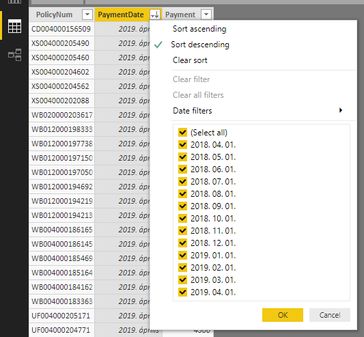FabCon is coming to Atlanta
Join us at FabCon Atlanta from March 16 - 20, 2026, for the ultimate Fabric, Power BI, AI and SQL community-led event. Save $200 with code FABCOMM.
Register now!- Power BI forums
- Get Help with Power BI
- Desktop
- Service
- Report Server
- Power Query
- Mobile Apps
- Developer
- DAX Commands and Tips
- Custom Visuals Development Discussion
- Health and Life Sciences
- Power BI Spanish forums
- Translated Spanish Desktop
- Training and Consulting
- Instructor Led Training
- Dashboard in a Day for Women, by Women
- Galleries
- Data Stories Gallery
- Themes Gallery
- Contests Gallery
- Quick Measures Gallery
- Notebook Gallery
- Translytical Task Flow Gallery
- TMDL Gallery
- R Script Showcase
- Webinars and Video Gallery
- Ideas
- Custom Visuals Ideas (read-only)
- Issues
- Issues
- Events
- Upcoming Events
To celebrate FabCon Vienna, we are offering 50% off select exams. Ends October 3rd. Request your discount now.
- Power BI forums
- Forums
- Get Help with Power BI
- Desktop
- FIRSTDATE and LASTDATE functions return first and ...
- Subscribe to RSS Feed
- Mark Topic as New
- Mark Topic as Read
- Float this Topic for Current User
- Bookmark
- Subscribe
- Printer Friendly Page
- Mark as New
- Bookmark
- Subscribe
- Mute
- Subscribe to RSS Feed
- Permalink
- Report Inappropriate Content
FIRSTDATE and LASTDATE functions return first and last day of year, not column values
Hi, I have the below table with dates ranging from 2018.04.01 to 2019.04.01 with multiple payments in each month for multiple policies:
I need a measure that returns the latest date in that column, so I used LASTDATE(Payments[PaymentDate].[Date]), but that returns 2019.12.31, not 2019.04.01. Why could this be? Thanks!
Solved! Go to Solution.
- Mark as New
- Bookmark
- Subscribe
- Mute
- Subscribe to RSS Feed
- Permalink
- Report Inappropriate Content
Except that 2019.12.31 is not among the existing values in that column, 2019.04.01 is the last. 😉
A friend of mine helped me out and LASTDATE(Payments[PaymentDate]) without .date at the end gave me the expected result, thanks!
- Mark as New
- Bookmark
- Subscribe
- Mute
- Subscribe to RSS Feed
- Permalink
- Report Inappropriate Content
I had same issue where the FIRSTDATE formula pulled the very first date of its year, rather than the first date within the record...
I fixed with using MIN/MAX instead + not using the .[date] like Zoltan.
I have no idea why this fixes it but it is fixed...
- Mark as New
- Bookmark
- Subscribe
- Mute
- Subscribe to RSS Feed
- Permalink
- Report Inappropriate Content
Read your question once again. 2019.12.31 is definitely > 2019.04.01 so the measure is working fine.
Regards,
Ashish Mathur
http://www.ashishmathur.com
https://www.linkedin.com/in/excelenthusiasts/
- Mark as New
- Bookmark
- Subscribe
- Mute
- Subscribe to RSS Feed
- Permalink
- Report Inappropriate Content
Except that 2019.12.31 is not among the existing values in that column, 2019.04.01 is the last. 😉
A friend of mine helped me out and LASTDATE(Payments[PaymentDate]) without .date at the end gave me the expected result, thanks!



